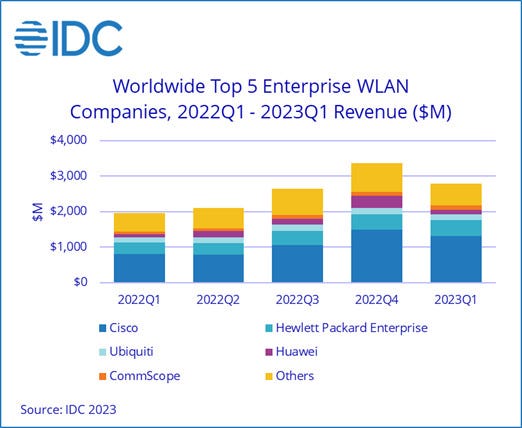BT taps HPE for global managed LAN serviceBT taps HPE for global managed LAN service
UK operator group BT has brought in HPE to help it address growing demand for hybrid working and IoT deployments.
June 30, 2023

UK operator group BT has brought in HPE to help it address growing demand for hybrid working and IoT deployments.
HPE’s Aruba Networking solutions will underpin BT’s new managed local area networking (LAN) service, which promises to overhaul enterprise customers’ in-building connectivity, enabling it to cope with anything that modern working methods can throw at it.
“It’s clear that legacy in-building networks can’t handle modern hybrid working and IoT devices, never mind what comes next. That’s why we’re expanding customer choice of managed LAN solutions by partnering with HPE Aruba Networking,” said Andrew Small, director of voice and digital work at BT’s Business division, in a statement on Thursday. “This will offer the visibility, flexibility and security customers need to deliver productive, trusted wired and wireless connectivity.”
Aruba LAN comes with a cloud-native management console to help customers keep tabs on which devices are connected to their network. Furthermore, delivering the whole thing as a managed service offers the flexibility to scale capacity up or down as needed, and easily add new features, like managed network security.
The solution is able to work in a multi-vendor environment, which means enterprises don’t have to undertake a complete rip and replace of their LAN. Ergo, the first step in the deployment process for BT is an audit of a customer’s existing LAN to identify what equipment can be reused, and what needs to be replaced.
After that, BT works on securing the network and the devices, and providing the cloud-based management dashboard. As well as keeping tabs on the network, it can identify redundant devices using unnecessary power, and automate network and energy optimisation.
“Global customers that are building their connectivity strategies are focusing on modern enterprise networks that are secure, agile, responsive to business needs and simple to operate, while being powerful drivers of transformation,” said Phil Mottram, EVP and general manager, HPE Aruba Networking. “HPE Aruba Networking is at the forefront of reinventing how customers and partners can consume or deliver business-outcome focused networking, and by integrating our AI, security, automation, and Network-as-a-Service capabilities, our global managed LAN service with BT is an example of how the network is helping customers achieve their business objectives.”
All that sounds very compelling, but there are signs – in the wireless side of the enterprise LAN market at least – that a correction might be in the offing.
According to figures published earlier this month by research firm Dell’Oro, enterprise WLAN revenues surged 48 percent year-on-year in the first quarter of the year, reaching $2.7 billion. Dell’Oro’s Wireless LAN research director Siân Morgan noted that the market hasn’t seen such consistent y-o-y revenue growth for 10 years. Dell’Oro expects revenues to reach $10 billion this year.
Before anyone gets carried away though, Dell’Oro said the growth in Q1 appears to have been driven by backlogged orders being filled, and that this is actually masking a decline in new orders.
IDC published its own figures this month that put global enterprise WLAN revenue at $2.8 billion in the first quarter, up 43.3 percent on last year. Similarly to Dell’Oro, IDC said growth was driven by the easing of component shortages and supply constraints, allowing suppliers to catch up with back orders.
In terms of vendors, IDC ranks HPE Aruba second by Q1 market share at 16 percent, noting that its revenue grew 39.5 percent. Cisco is still the clear leader though, with a market share of 47.1 percent, and impressive enterprise WLAN revenue growth of 62.7 percent (see chart).

Get the latest news straight to your inbox. Register for the Telecoms.com newsletter here.
About the Author
You May Also Like










.png?width=300&auto=webp&quality=80&disable=upscale)


_1.jpg?width=300&auto=webp&quality=80&disable=upscale)